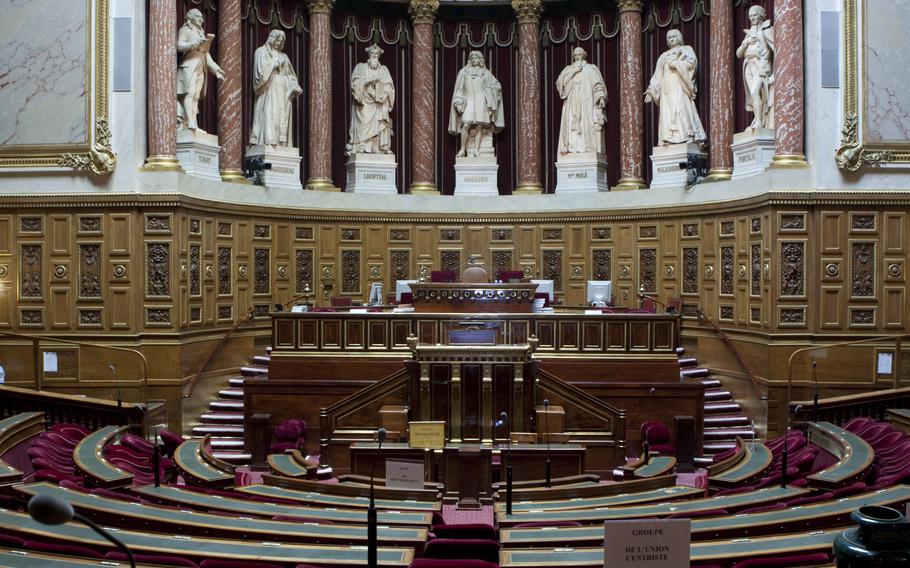
The French Senate. (Wikimedia Commons)
The French government’s pioneering push to become the first country in the world to enshrine abortion rights in its constitution got a huge boost Wednesday with lawmakers in the right-dominated Senate voting to inscribe abortion as a “guaranteed freedom.”
The bill still faces one final test: whether it can secure the backing of three-fifths of lawmakers from both houses of parliament in a special congress on Monday at Versailles. But the extent of support in the Senate, with 267 votes in favor and 50 against, following the overwhelming endorsement in the National Assembly last month, had government officials and abortion rights activists claiming victory.
“This evening, the Senate wrote a new page in women’s rights. This vote is historic,” Minister of Justice Eric Dupond-Moretti said. “We will be the first country in the world to enshrine in the Constitution this freedom for women to control their bodies. This vote, basically, reiterates to those who do not yet know that the women of our country are free. This vote reiterates the extent to which we are all attached to this freedom.”
The proposed change to France’s constitution is a direct reaction to the U.S. Supreme Court’s 2022 ruling to overturn Roe v. Wade.
The plain-language introduction of the French bill didn’t hesitate to point to events in the United States as the catalyst. Under the question “Why this text?” it reads: “In the United States, the right to abortion was called into question at the federal level by a decision of the Supreme Court of June 24, 2022. In other countries, particularly in Europe, certain movements intend to restrict the right to abortion and contraception.”
The French public overwhelmingly supports abortion rights, and abortion is legal for any reason through the 14th week of pregnancy. But the U.S. court decision, and the state bans that followed, energized activists in France and beyond to further shield their rights.
In Britain, Labour lawmaker Diana Johnson is pushing for a vote in Parliament next month that could see abortion decriminalized. She has spoken out about the “stark message” sent by the U.S. Supreme Court’s decision.
Activists in France sought the constitutional change because abortion rights are “under threat around the world and in Europe, when far-right governments are elected,” said Mathilde Philip-Gay, a law professor at Jean Moulin Lyon 3 University.
“Everybody knows that the government can change in France and that the next election could see the win of [Marine] Le Pen. She is not against abortion, but her party is traditionally against it, and far-right movements are traditionally against the right to abortion. So, it’s not a problem now, but it’s a reaction to what’s happened to the U.S. and to the political elections in Europe of the far right.”
Poland has been the most prominent example of a country in Europe moving to further restrict abortion, and the new centrist government there is facing challenges as it tries to reverse the near-total ban.
Abortion activists have been watching efforts in France closely.
Last month, lawmakers in the National Assembly, the lower house of France’s Parliament, voted 493 to 30 in favor of the proposal by President Emmanuel Macron’s government.
But whereas the vote in the assembly benefited from support from Macron’s centrist minority coalition and left-wing opposition parties, approval in the Senate, where lawmakers on the right have more power, was always going to be more difficult.
Some senators expressed concerns about the wording of the bill. In a 2022 debate, the lower house favored the term “right,” while the upper house preferred “freedom.” Activists said that the “right” to an abortion was a stronger term than “freedom” as it would force the state to provide measures necessarily for an abortion. The government backed the term “guaranteed freedom,” which seemed to be a middle ground. This was the language backed by the Senate on Wednesday.
“The Senate is taking a decisive step which I welcome,” Macron said, announcing Monday’s special congress. He repeated an earlier pledge: “I am committed to making women’s freedom to have an abortion irreversible by enshrining it in the Constitution.”
Analysts said it was highly likely that the special congress would back the proposal. “In politics, you never know. But it would be a big surprise if the text wasn’t adopted,” Philip-Gay said.
Lola Schulmann, an advocacy officer with Amnesty in Paris, posted a picture of a uterus with a French flag and wrote on X, “A historic opportunity for France to place itself on the side of women and a hope for those who defend the right to abortion throughout the world.”